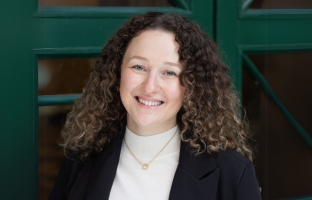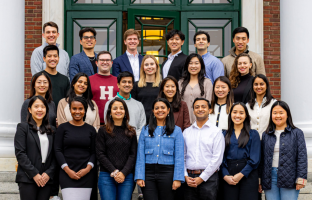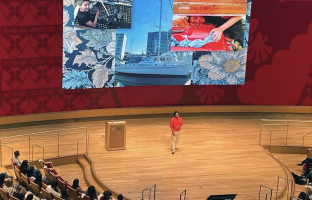Paulina Llano (MBA 2022) has traveled the world for education and business, but Cali, Colombia will always be home. In fact, it has been her family’s home for the past 300 years, so the city, and the country as a whole, are deeply engrained in her heart.
At the same time, Llano has happily found herself in Boston at Harvard Business School and is spending the summer interning for a Cambridge-based pharmaceutical and biotech company that has become a household name – Moderna. The contributions Llano will be making to the team and the lessons she will learn in her experience will help her reach her ultimate goal – working in her home country to make it a better place.
Positioning Herself for Success
After high school, Llano lived in France for a year and then studied Business Administration and Political Science at Universidad de los Andes in Colombia. “I had considered coming to the U.S. for undergrad, but I made the conscious decision to go back and start a network and learn about Colombian business,” Llano shared. “My family has a business tradition that’s over 120 years old and I felt a responsibility to the family business while also complimenting that with something I’m very passionate about, which is Political Science.”
During undergrad, Llano interned at McKinsey and joined the firm full-time in Bogota after graduation. She spent three years traveling and working on a variety of projects before taking her “third year out” working for her local government in Cali’s Chamber of Commerce. Throughout this time, she focused on launching the digital economy cluster to facilitate collaboration between private companies, governments, and universities to make the region more competitive.
Working at the intersection of business and government was the perfect transition into Harvard Business School. Here, Llano could continue to grow as a leader able to make an impact across sectors.
Setting and Resetting the Target
One goal Llano set for herself upon entering business school was to work in the U.S. over the summer. “There are industries and functions in the U.S. that are stronger than in Colombia and I want to continue learning before I eventually go back to my country,” she explained.
Specifically, healthcare and government engagement were two areas of interest, but Llano was open to exploring multiple options. “I started my internship search focused on Miami and I tried startups and growth funds but found the opportunities to be limited,” she said. “It took me a while to recognize that even though Miami would put me closer to my family geographically, it may not be the best decision for me. So, I retargeted to explore opportunities in Boston and New York.”
With her industry and functional targets still wide, 12Twenty geographical searches became a major part of Llano’s internship search strategy. One of those searches led her to a role that seemed too good to be true, the Government Engagement Intern role for Moderna. “I saw the posting and thought ‘Wow, wouldn’t it be amazing to work for this company that is literally saving the world?’ Plus the public and private side approach was one I was very interested in.”
Taking Her Shot
However, when Llano reviewed the job description, she was certain that Moderna would prefer a different candidate for the role. “The intern would be working with the DC team and tasked with rethinking the government engagement function at Moderna so I assumed this would be a role for an American citizen who knew the U.S. Congress inside and out,” Llano shared. “But I applied anyway.”
Proving the old saying that you’ll miss every shot you don’t take, to Llano’s delight her application was picked from the pile. She quickly received an interview and then had a job offer after one fifteen-minute interview with her manager.
“I had experience from my interviews in Miami so that helped, and I was relaxed because I thought this was just a first-round interview,” Llano shared. “In the conversation, I was very honest about my experience. I explained how I had done organizational structuring work at McKinsey, but that I didn’t know a lot about DC or public policy in the U.S. I was passionate about the public sector though, and my passion for making Moderna’s products more accessible showed.”
Embracing the Challenge
Llano’s internship is exactly the combination of challenge and contribution she hoped for, and she looks forward to bringing lessons learned back to her sponsoring organization, McKinsey, after graduation.
“I really believe in the potential of Moderna products and in this role, I’m imagining the future of global success and what will be needed from the government engagement function,” said Llano. “We’re looking to bring in best practices from other disruptive companies without losing the flat, nimble, Moderna culture.”
Looking ahead, Llano knows that the experience of working for a company who is contributing so much to world health will be an experience she’ll never forget. She’ll also be able to utilize her experience to help other companies reach the poorest parts of the world and position themselves in the market. “This is a historical moment that will change how we see medicine and that’s very exciting,” she said.
The Value of New Perspectives
Llano was thrilled that Moderna immediately saw the value she could bring to their team as an international student and encourages other companies to take the same chance on candidates who have different backgrounds.
“It’s great when companies think about the value people from different nationalities, genders, races, undergraduate education, and work experience can add to their multidisciplinary teams,” she said. “What if we could imagine a pianist being a banker, or a woman from Colombia rethinking U.S. government engagement,” Llano’s lack of direct experience in U.S. public policy didn’t serve as a hindrance, instead it was an asset as she could bring in a new perspective.
To broaden the pool of candidates and seek out those with less traditional backgrounds, Llano recommends that companies avoid filter questions on applications that look for a certain undergraduate degree or specific experience. “These types of questions subtract more than they add,” she shared. Instead, consider candidates’ transferable skills and how they relate to the role.
Furthermore, to the extent possible, Llano encourages recruiters to share feedback with candidates who aren’t selected. While Llano ultimately landed her ideal role, it came after some rejection – as is very common in the internship search process. Rejection can be difficult, but when feedback is provided it can be viewed as a learning opportunity. Llano said, “Feedback adds to our two-year experience as students and helps us understand where we didn’t meet expectations as candidates and improve for the next time.” This inclination towards constant improvement and growth is shared among Llano’s classmates and is another reason HBS students from a variety of backgrounds can come into your organization ready to learn and contribute as interns and full-time employees.






.png&w=80&h=80)
